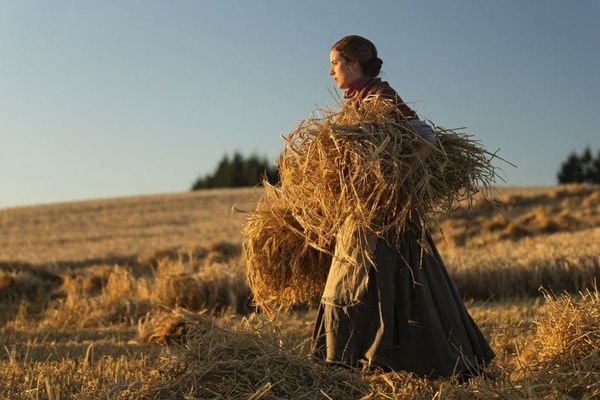Eye For Film >> Movies >> Sunset Song (2015) Film Review
Sunset Song
Reviewed by: Amber Wilkinson

In Scotland, few films have been as long-awaited as Sunset Song. It took director Terrence Davies around 15 years to get production started on this adaptation of the classic novel by Lewis Grassic Gibbon concerning the trials of a young woman in the run-up to and during World War I. The film has also, reportedly, spent a long time in the edit and there is a sense, particularly towards the end, that too many cooks may have had their fingers in the pie.
The film, as you would expect from Davies, looks beautiful, with cinematographer Michael McDonough capturing the earthy browns, golden fields and lush greens of Scotland (with New Zealand and Luxembourg also making an appearance as solid substitutes) right from the impeccable first shot of a camera floating gently over a wheat field as the wind rattles through the ripened crops. Here we meet Chris Guthrie (Agyness Deyn) in her element and almost elemental as she rises up through the wheat. Throughout the film when she is outside, there is a sense of wildness, a possibility of freedom, with interiors marking out confinement and restriction to role.

Chris lives under the oppressive tyrany of her father (Peter Mullan). He fully dominates the household, and to an extent, the opening hour of the film, with his flaring anger and brutal violence foreshadowing the equally cruel Great War that will irrevocably alter Chris' life. Mullan has been here before but always finds subtle ways of marking out his monsters and a scene in which we see him try to fight the failings of his own physicality is magnetic. But this is not his story. It is, on a basic level, the tale of one woman's progress against patriarchy - first represented by her father and then by her first love Ewan Tavendale (Kevin Guthrie), who will also find himself brutalised by circumstances beyond his control.
Elegant storytelling in the first half of the film shows Chris making tentative steps towards the woman she is on the verge of becoming - Davies lets us glimpse her inner life through her consideration of herself in mirror glances right through the film. Deyn, best known for being a supermodel and with just a handful of screen credits, lets her vulnerability show and if her transition to matriarch isn't handled quite as subtly as Davies' clever dissolves and segues to denote the passage of time, she certainly isn't bad. It's perhaps unfortunate for her that Saoirse Ronan will also be undergoing a woman's progress on screen this autumn in Brooklyn, imbuing it with the gradual shift and emotional depth we're left longing for here. Davies doesn't pull his punches - or belt barbs - but he finds contrast in the new mown hay sweetness of Guthrie's relationship with Ewan. We feel the heat of their early relationship, which is why it is such a pity that the film's second half becomes problematic.
Once the war starts, things begin to feel choppy and the tonal change never quite beds in. Characters start to come and go with little introduction or adieu, making it hard to keep track of them and making it difficult for the supporting actors to deliver their handful of lines with much-needed conviction. While the craft remains faultless, the effect becomes like walking through a beautiful gallery, with each painting looking lovely but with little connection to the one before or after. The horror of war also descends on Ewan in what seems like a heartbeat, his character shift grindingly unconvincing against what has gone before. This is no fault of Guthrie's but rather of a script that expects him to work psychological magic with nothing of substance.
It seems a shame that Davies felt able to linger for minutes over the villagers walking to church and yet gives such short shrift to character development and believability in these later scenes. Despite the two-hour runtime, the ending feels hurried and less satisfying than it should after such an investment of time.
Reviewed on: 04 Oct 2015
















